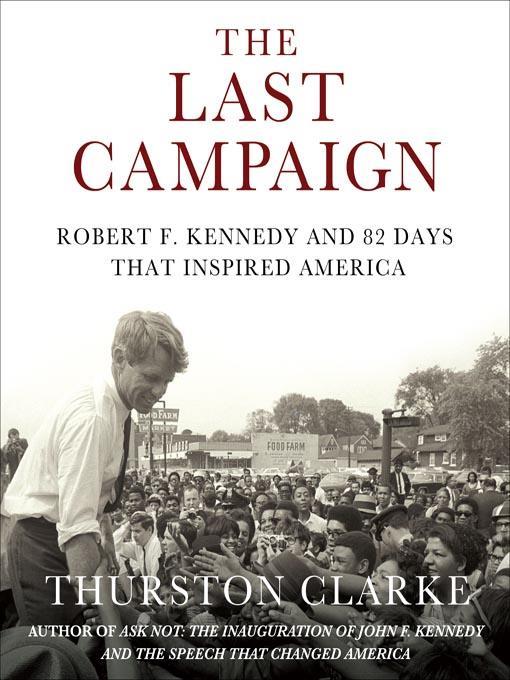
The Last Campaign
Robert F. Kennedy and 82 Days That Inspired America
کتاب های مرتبط
- اطلاعات
- نقد و بررسی
- دیدگاه کاربران
نقد و بررسی

Clarke examines the enormous effect on Americans of RFK's eighty-two-day campaign for the presidency. RFK became a candidate because he hoped to help heal a morally wounded nation. It was 1968. An unpopular president (Johnson) was waging a controversial war (Vietnam). By deciding to run, RFK infuriated Johnson and angered everyone from white Southerners to the business community, from organized crime to machine pols like Chicago's Mayor Daly. The year also saw the Tet Offensive, the My Lai massacre, Martin Luther King, Jr.'s, assassination, and the worst racial disturbances since the Civil War. Pete Larkin narrates in the best storytelling tradition, avoiding any trace of theatricality or "broadcast voice." He makes Clarke's well-researched page out of recent American history hard to put down. S.J.H. Winner of AudioFile Earphones Award (c) AudioFile 2008, Portland, Maine

March 31, 2008
In this hagiographic narrative of Robert F. Kennedy’s 1968 Democratic presidential primary campaign, RFK seems less a politician than a moral teacher. Hammering away at the immorality of poverty and racism, he confronted crowds with their own ethical culpability and, regarding the Vietnam War, reminding campus audiences of the unfairness of student draft deferments. Rapturous throngs of voters ate it up and propelled RFK to a string of victories. Clarke (Ask Not
) positions Kennedy as a prototypical New Democrat who appealed to minorities and working-class whites alike by mixing liberalism with themes of law and order, free enterprise, jobs and local control. But in Clarke’s telling, Kennedy’s essence is spiritual rather than political; he is a Christ figure— comforting sick children, utterly sincere in his beliefs and incapable of political pandering, haunted by forebodings of his assassination, his charisma “tactile and mystical... he had to let people see, touch, and commune with him.” Clarke emphasizes the Kennedy campaign’s contemporary resonance, but his book is more revealing as an iconic portrait of the passionate, turbulent zeitgeist of the 1960s. 8 pages of b&w photos.

July 28, 2008
Forty years before Obamamania, there was another White House run that was so frenzied, reporters feared they'd be crushed to death by the electrified crowds he generated. Clarke's encyclopedic study of that short-lived, 11th-hour bid in the spring of 1968 reminds listeners that Robert F. Kennedy understood that the fanaticism toward his campaign was a transmutation of the grief the nation felt over the assassination of his brother. In less than three months, RFK became presidential in his own right, inspiring Americans with both his message of hope and unparalleled oratory gifts. It's precisely this finesse with speech that proves the greatest challenge for this audio: Pete Larkin's reading of Kennedy's addresses simply can't compete with the late politician's familiar delivery. Larkin has the daunting task of calibrating his tone so as to match the optimism of the campaign's first 81 days, while acknowledging the horror of day 82. Without doing impersonations, Larkin uses slight pitch changes to differentiate between Kennedy and others. A Henry Holt hardcover (Reviews, Mar. 31).

























دیدگاه کاربران